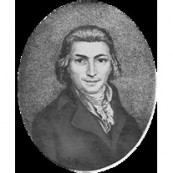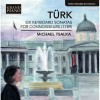Biography
Daniel Gottlob Türk (10 August 1750 – 26 August 1813) was a notable composer, organist, and music professor of the Classical Period.
Born in Claußnitz, Saxony, Türk studied organ under his father and later under Johann Adam Hiller.[1] It was Hiller who recommended Türk for his first professional position at Halle University, in Halle, Germany. On April 18, 1779, Halle University granted Türk's request to begin lecturing on music theory, making him the University's "Director of Music." This appointment made Türk the second university music director in Germany.[2] While at Halle, Türk published his treatise On the Role of the Organist in Worship which is still occasionally reprinted.
Several of Türk's dances and minuets for the piano are still popular today. He wrote 18 sonatas. His most notable contribution to the classical music canon is the Klavierschule, a teaching guide for the keyboard. He also wrote a cantata The Shepherds of Bethlehem (1782) and some organ pieces and other choral works in manuscript.
In 1783 he married Johanna Dorothea Raisin Schimmelpfennig, by whom he had two children. He was a member of the Halle Masonic Lodge, "One of the three swords," along with Carle Loewe. In 1813 Türk fell ill and died from a severe liver disease.







